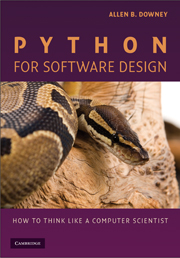Book contents
- Frontmatter
- Contents
- Preface
- Python for Software Design
- 1 The Way of the Program
- 2 Variables, Expressions, and Statements
- 3 Functions
- 4 Case Study: Interface Design
- 5 Conditionals and Recursion
- 6 Fruitful Functions
- 7 Iteration
- 8 Strings
- 9 Case Study: Word Play
- 10 Lists
- 11 Dictionaries
- 12 Tuples
- 13 Case Study: Data Structure Selection
- 14 Files
- 15 Classes and Objects
- 16 Classes and Functions
- 17 Classes and Methods
- 18 Inheritance
- 19 Case Study: Tkinter
- Appendix
- Index
18 - Inheritance
Published online by Cambridge University Press: 05 June 2012
- Frontmatter
- Contents
- Preface
- Python for Software Design
- 1 The Way of the Program
- 2 Variables, Expressions, and Statements
- 3 Functions
- 4 Case Study: Interface Design
- 5 Conditionals and Recursion
- 6 Fruitful Functions
- 7 Iteration
- 8 Strings
- 9 Case Study: Word Play
- 10 Lists
- 11 Dictionaries
- 12 Tuples
- 13 Case Study: Data Structure Selection
- 14 Files
- 15 Classes and Objects
- 16 Classes and Functions
- 17 Classes and Methods
- 18 Inheritance
- 19 Case Study: Tkinter
- Appendix
- Index
Summary
In this chapter we will develop classes to represent playing cards, decks of cards, and poker hands. If you don't play poker, you can read about it at wikipedia.org/wiki/Poker, but you don't have to; I'll tell you what you need to know for the exercises.
If you are not familiar with Anglo-American playing cards, you can read about them at wikipedia.org/wiki/Playing_cards.
CARD OBJECTS
There are fifty-two cards in a deck, each of which belongs to one of four suits and one of thirteen ranks. The suits are Spades, Hearts, Diamonds, and Clubs (in descending order in bridge). The ranks are Ace, 2, 3, 4, 5, 6, 7, 8, 9, 10, Jack, Queen, and King. Depending on the game that you are playing, an Ace may be higher than King or lower than 2.
If we want to define a new object to represent a playing card, it is obvious what the attributes should be: rank and suit. It is not as obvious what type the attributes should be. One possibility is to use strings containing words like ‘Spade’ for suits and ‘Queen’ for ranks. One problem with this implementation is that it would not be easy to compare cards to see which had a higher rank or suit.
An alternative is to use integers to encode the ranks and suits. In this context, “encode” means that we are going to define a mapping between numbers and suits, or between numbers and ranks.
- Type
- Chapter
- Information
- Python for Software DesignHow to Think Like a Computer Scientist, pp. 201 - 213Publisher: Cambridge University PressPrint publication year: 2009



